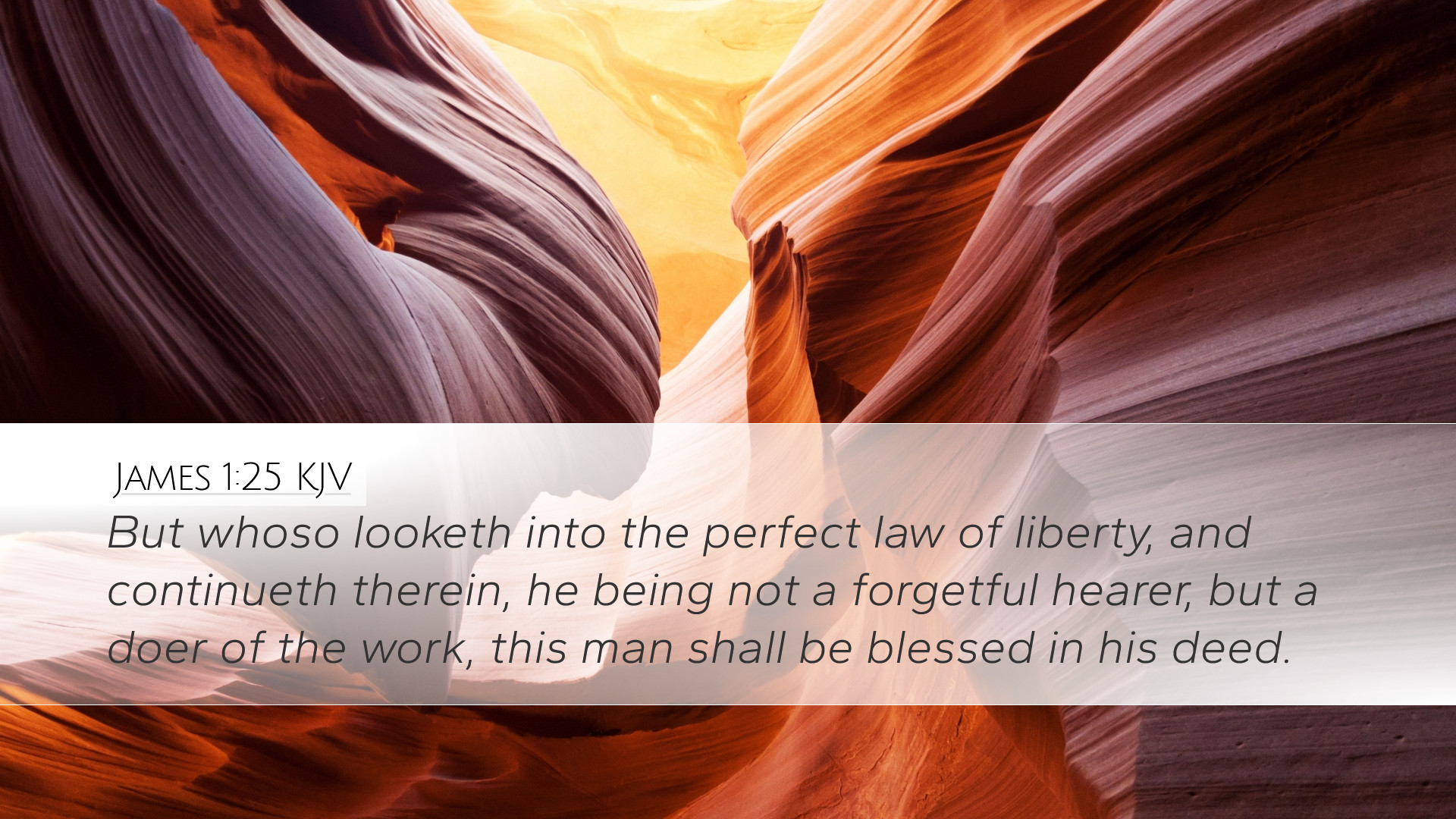Old Testament
Genesis Exodus Leviticus Numbers Deuteronomy Joshua Judges Ruth 1 Samuel 2 Samuel 1 Kings 2 Kings 1 Chronicles 2 Chronicles Ezra Nehemiah Esther Job Psalms Proverbs Ecclesiastes Song of Solomon Isaiah Jeremiah Lamentations Ezekiel Daniel Hosea Joel Amos Obadiah Jonah Micah Nahum Habakkuk Zephaniah Haggai Zechariah MalachiJames 1:25
James 1:25 KJV
But whoso looketh into the perfect law of liberty, and continueth therein, he being not a forgetful hearer, but a doer of the work, this man shall be blessed in his deed.
James 1:25 Bible Commentary
Commentary on James 1:25
James 1:25 (KJV): "But whoso looketh into the perfect law of liberty, and continueth therein, he being not a forgetful hearer, but a doer of the work, this man shall be blessed in his deed."
Introduction
The Epistle of James is notable for its practical teachings on faith and works. In James 1:25, the Apostle emphasizes the importance of engaging with God's Word actively and consistently. This commentary will explore the significance of "looking into the perfect law of liberty," the call for action beyond mere hearing, and the promise of blessing associated with obedience.
Exegesis and Interpretation
The Perfect Law of Liberty
James refers to the Scriptures as the "perfect law of liberty." Albert Barnes asserts that this phrase encapsulates the true essence of the Gospel—a law that frees rather than binds. Unlike the legalistic interpretations of the Old Covenant, which often left believers feeling condemned, the Gospel liberates them to live righteously. This law guides believers toward holiness while providing the freedom that only Christ can offer.
Looking Into the Law
The term "looketh into" (Greek: parakupsas) conveys more than a mere glance. Matthew Henry emphasizes the need for a thorough and reflective engagement with Scripture. It indicates an earnest desire to understand and absorb the teachings found within. True engagement involves both comprehension and meditation, leading to transformation in the believer's life.
Continueth Therein
James stresses the importance of perseverance: "and continueth therein." Adam Clarke elaborates that it is not enough to have a momentary interest in God's Word; believers are called to abide in it. This longevity in study and application signifies an ongoing relationship with God and His teachings, which fosters spiritual maturity and growth. The implication of continuity highlights the need for regular discipline in reading and applying Scripture.
Not a Forgetful Hearer
The distinction between a "forgetful hearer" and a "doer of the work" illustrates a critical aspect of faith. Matthew Henry notes that many Christians hear the Word but fail to implement its teachings in their daily lives. This can lead to spiritual stagnation and barrenness. The admonition here serves as a rallying cry for believers to move beyond passive listening to active obedience.
The Blessing of Action
The concluding promise in this verse is one of blessing: "this man shall be blessed in his deed." Albert Barnes reiterates that such blessings are not merely material but encompass spiritual enrichment and fulfillment. God's favor rests upon those who engage with His Word actively and allow it to shape their actions. The assurance of blessing is intertwined with the faithfulness of the believer's response to God's call through His Word.
Theological Insights
Faith and Works
James famously emphasizes the relationship between faith and works throughout his epistle. This verse is a practical application of that concept—true faith will naturally produce righteous actions. Adam Clarke argues that this intertwining of belief and action is foundational to the Christian ethic and is echoed throughout Scripture where obedience follows a genuine faith in God.
Liberty in Christ
The idea of liberty is paramount in the Christian faith. Matthew Henry explores how this liberty does not grant believers the license to sin but rather liberates them from the burden of sin. The believer, empowered by the Holy Spirit, is free to pursue holiness and righteousness as outlined in God’s Word. The perfect law serves not just as a guide but as a means of grace that enables believers to live in accordance with God's will.
Practical Applications
Daily Engagement with Scripture
For pastors, students, and theologians, James 1:25 challenges individuals to cultivate a discipline of studying Scripture regularly. Albert Barnes encourages readers to establish a daily routine that prioritizes exposure to God's Word—reading, meditating, and applying its truths. This approach reinforces a deep engagement with the ‘perfect law.’
Community and Accountability
Engaging with Scripture is not solely an individual pursuit. Adam Clarke highlights the need for community. Believers should hold one another accountable in their journeys to be "doers" of the Word. Group studies, discussions, and accountability partnerships foster an environment where individuals can grow together, share insights, and encourage one another in applying the teachings of the Bible in their lives.
Conclusion
James 1:25 serves as a profound reminder of the necessity of an active faith characterized by engagement with God's Word. The "perfect law of liberty" invites believers to not just hear but to implement its teachings actively in their lives. As we look into Scripture, may we find the freedom to live out our faith, embodying the blessings that come from being doers of the Word.


